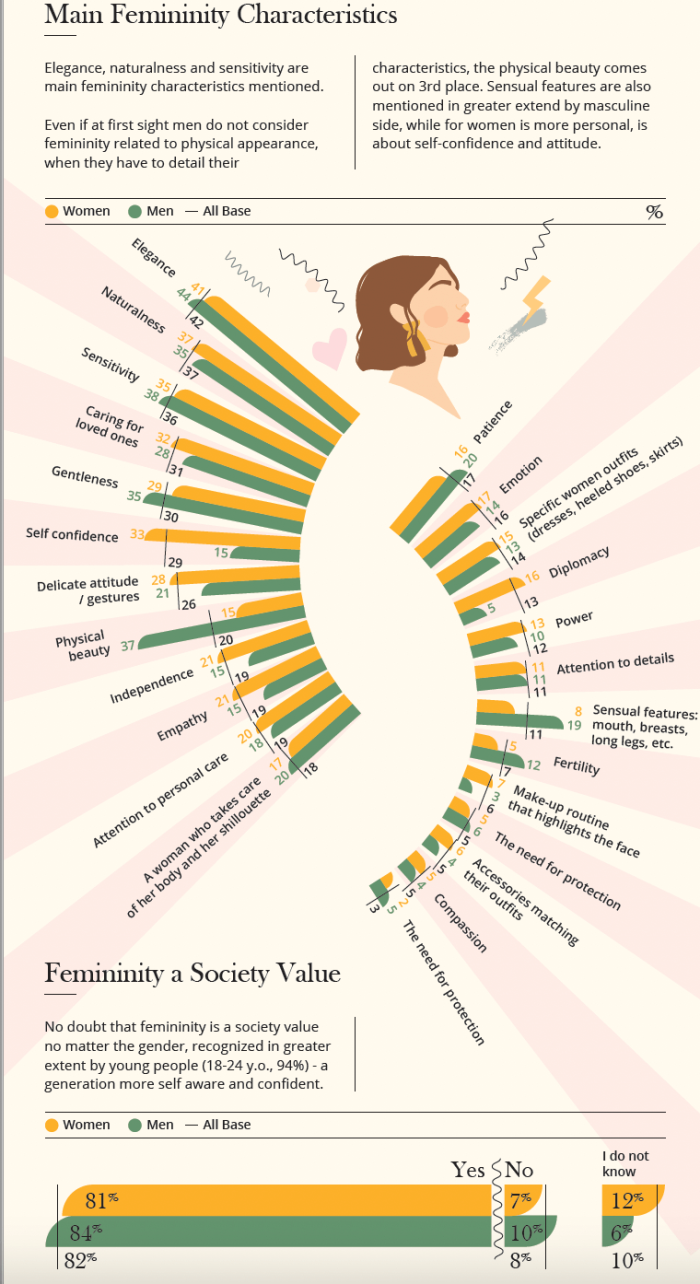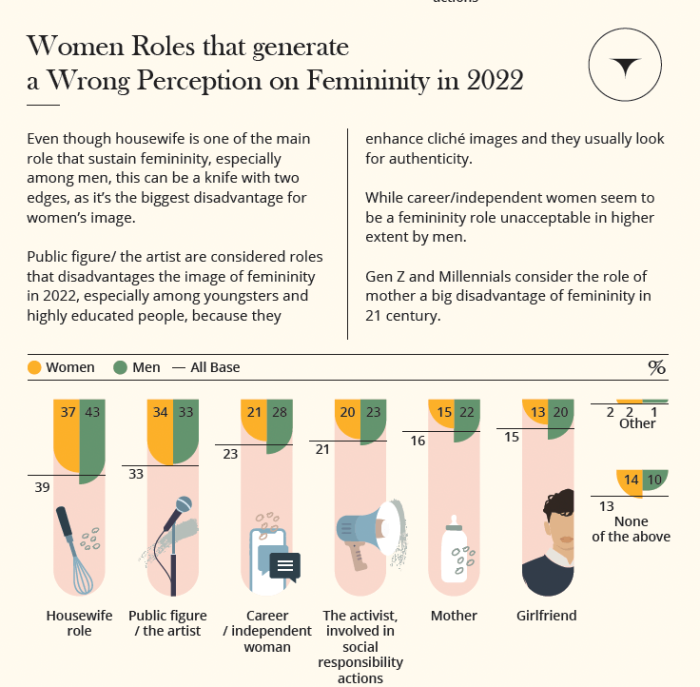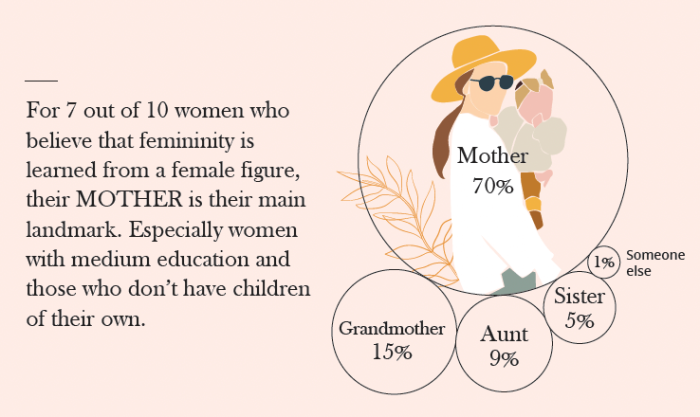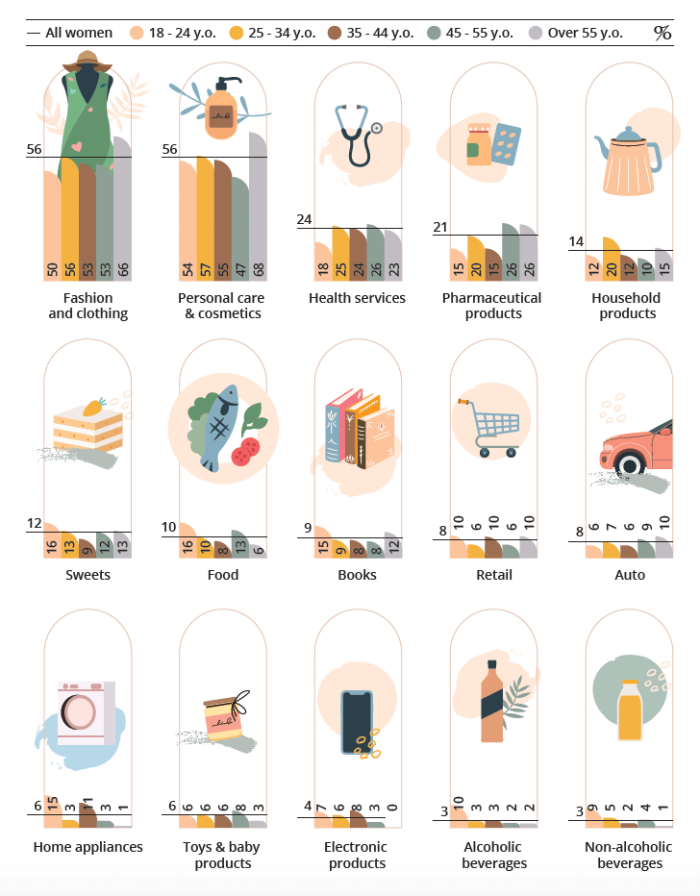The Unspoken Femininity study conducted by Starcom Romania explores the concept of femininity in a complex, multi-generational and gender-equitable way, investigating both female and male perceptions. It thus aims to answer a series of questions such as: To what extent is femininity still relevant in 2022? What does it actually mean, and how is it perceived by three different generations – Gen Z, Millennials and Boomers? How is femininity understood and valued in a society with strong (historically) patriarchal undertones?
It is well known that femininity is often about a person’s identity, a set of behaviours and attitudes, but in other cases, it is also a social label that comes with lots of expectations and projections. Starcom Romania team considered it essential, in a context strongly marked by change, to explore the extent to which several concepts related to the feminine universe still have the same cultural decoding, are still relevant or still use the same visual grammar as a few years ago.
Femininity – a suite of attitudes, behaviours and values
In the Unspoken Femininity study, 8 out of 10 respondents said that values and attitudes apriori define femininity, while physical appearance, clothing and accessories are important but on a secondary level.
In addition, respondents perceive femininity as a social value. Although equally present in both sexes, this perception is decoded differently both generationally and from a gender perspective. Thus, Gen Z considers femininity a native attribute related to naturalness, self-confidence, and how a woman expresses and supports her opinions. According to respondents in this age group, femininity is an attribute that has been enhanced over the years through life experiences, through inspirational role models with whom they intersect or whom they follow.
More mature generations, on the other hand, value elegance, which is considered the first essential criterion for a person to be feminine. Elegance is defined by a series of behaviours – appropriate language and care for others, but also by neat, accessorized clothing.
Femininity, role models and women’s roles in 2022
When it comes to roles and role models, the role model of a mother or a prominent female figure from childhood is a style and femininity trigger only for generations over 35 y.o.. Younger generations form and reform their feminine style mainly through interactions related to social life and cultural development, with references more to ways of interaction outside the family.
According to the study of the multiple roles a woman takes on throughout her life, the role of mother is defined from both a female and male perspective for generations 35+. As for younger generations, they prioritize the role of the independent, career-focused woman.
From the perspective of roles that disadvantage femininity in the year 2022, the image of the housewife comes first, nominated more by men than by women.
Varied perceptions of femininity
Femininity is undoubtedly a social value supported by women and men alike. But when we move away from the theoretical side, reality shows us a number of cultural patterns that make the generation gap even more obvious. Thus, 8 out of 10 women consider femininity to be about determination, self-confidence and self-respect, but at the same time, many of the female respondents aged over 35 consider femininity to be a complex role, which they do not master very well and do not internalize yet when it comes to self-confidence and self-care.
Brands in relation to femininity
As far as brands are concerned, 6 out of 10 women believe that brands promote a series of visual and conceptual patterns that explore femininity but emphasize the superficial side, linked to the universe of clothing and roles at hand, often clichéd.
Authenticity is the main thing women would like to see in the creative executions of brands – from real, natural, everyday situations to the selection of the protagonists in commercials.
Another important aspect is related to the content, the brand’s involvement in certain social causes and social activism: Gen Z and Millennials consider women empowerment conveyed by brands as extremely important.
Influencer marketing also plays an important but polarizing role. Influencers are scrutinized very closely when talking about social values, and content creators who only feed the outer, superficial side of femininity in a clichéd way are perceived as visual clutter on social media (especially by younger generations).
Featured products
 All Publicis Groupe Romania proprietary data tools in one place.
All Publicis Groupe Romania proprietary data tools in one place.Discover the power of our tools and feel free to get in touch.












